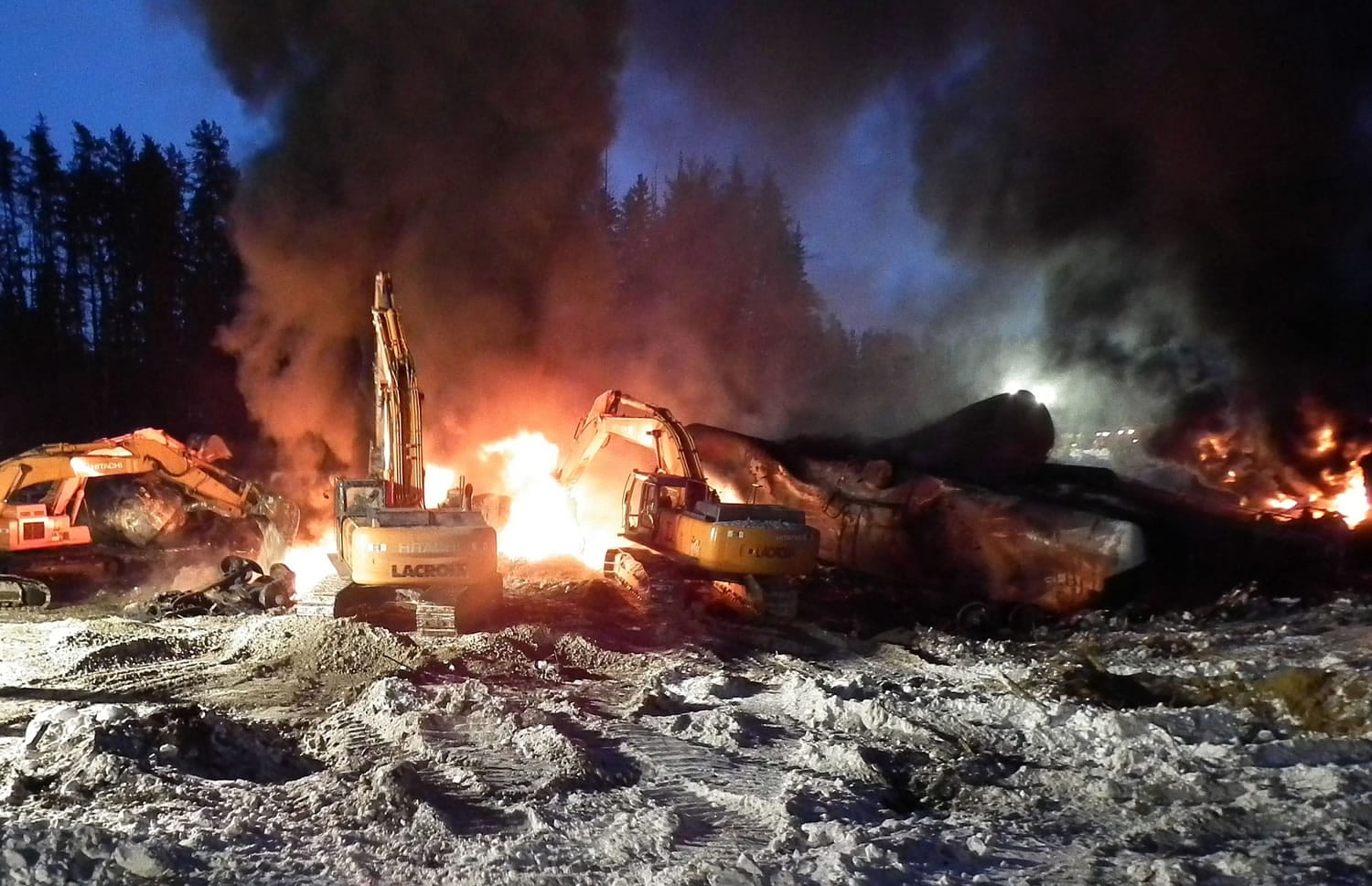TORONTO — A fiery oil train derailment in Ontario this month suggests new safety requirements for tank cars carrying flammable liquids are inadequate, Canada’s transport safety board announced Monday.
The accident was the latest in a spate of fiery derailments in Canada and the U.S., a trend which American safety officials say drives home the need for stronger tank cars, more effective braking systems and other safety improvements.
The Canadian Transportation Safety Board said the tank cars involved in the Feb. 14 train derailment met upgraded standards that started to be instituted in Canada last year for new tank cars carrying crude and other flammable liquids. But it said the Class 111, 1232 standard cars still “performed similarly” to those involved in the derailment in Lac-Megantic, Quebec that killed 47 people two years ago. That accident predated the changes.
“This was supposed to be a better quality car. So far we haven’t seen that better performance,” Rob Johnston, a senior Transportation Safety Board official, said in an interview with The Associated Press.
The U.S. and Canada are trying to coordinate on even newer tank car standards. U.S. Transportation Secretary Anthony Foxx met with safety officials in Canada in December to discuss the issue but neither country has yet settled on a new tank car design, though the U.S. is getting closer. Transportation officials recently sent a proposal for new tank car standards to the White House budget office for review.
In both cases in Canada, the tank cars ruptured and released crude oil, which fed the flames. Much of downtown Lac Megantic, Quebec, was destroyed on July 6, 2013, by a raging fire caused when an unattended train derailed. Several train cars exploded and 40 buildings were leveled.
The Canadian government has warned the Obama administration that if pipelines like the controversial Keystone XL pipeline are not built Canadian oil would instead continue to be shipped by rail cars.
The latest Canadian derailment, involving a Canadian National Railway Co. train, happened in a remote area 50 miles (80 kilometers) south of Timmins, Ontario. There were no injuries or evacuations. It took almost a week in subzero temperatures for the fires to burn out.
Two days after the Ontario derailment, a train loaded with crude derailed in West Virginia, sparking a spectacular fire and forcing the evacuation of hundreds of families.
Both the West Virginia accident and the oil train derailment and fire in Ontario involved recently built tank cars that were supposed to be an improvement to a decades-old model in wide use that has proven susceptible to spills, fires and explosions.
But the Canadian safety board said at least 19 of the 25 cars in the Ontario derailment were breached or partially breached and estimated that more than 0.26 million gallons of crude were released. The board said the train was traveling at a lower speed than the train in Lac Megantic.
The agency said this month’s incident “demonstrates the inadequacy” of the new standards and is urging Canada’s transport regulator to quickly introduce enhanced protection standards. The amount of crude traveling by train has soared in recent years.
Safety officials are pushing to make the tanker-car fleet even stronger but are confronting opposition from energy companies and other tank car owners. Industry representatives say it could take a decade to retrofit and modify more than 50,000 tank cars, not the three years anticipated by U.S. federal officials, who assumed many cars would be put to new use hauling less-volatile Canadian oil-sands oil.
A U.S. proposal for new tank car standards is still under wraps but is in the works, and it’s expected to include significant safety enhancements to the 1232 design beyond what the oil industry has said is acceptable.
Zach Segal, a spokesman for Canada’s Transport minister, said Monday that Transport Canada, in collaboration with the U.S., is developing a next generation standard of tank car for the transport of flammable liquids that would be more robust than the current 1232 standard.
Chris Hart, the acting chairman of the U.S. National Transportation Safety Board, in a blog post on Monday called the 1232 cars a “marginal” improvement over the legacy DOT-111 cars. He urged federal regulators to act swiftly to set new tank car standards, noting that while the government is deliberating there are more 1232 cars being produced and entering service.
The U.S. federal government predicts that trains hauling crude oil or ethanol will derail an average of 10 times a year over the next two decades, causing more than $4 billion in damage and possibly killing hundreds of people if an accident happens in a densely populated part of the U.S. The projection, first reported by the AP, comes from a previously unreported analysis by the Department of Transportation that reviewed the risks of moving vast quantities of both fuels across the nation and through major cities.



